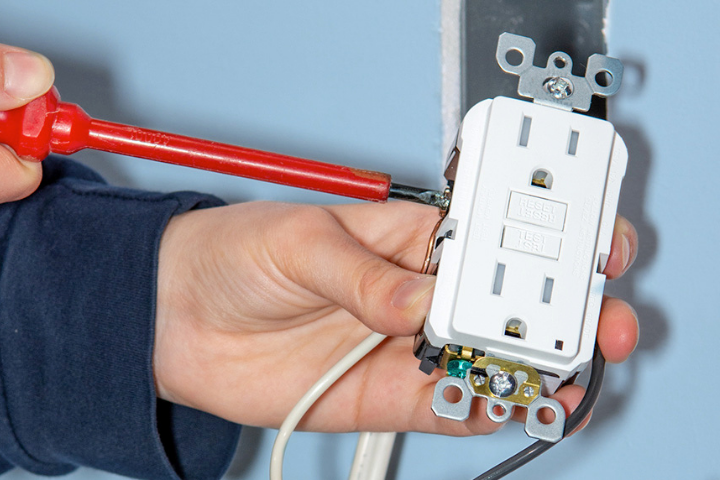Electrical Technician
Launch a Career as an Electrical Technician in as Little as 6 Weeks
Boost Your Resume By Learning Foundational Skills
Develop Confidence in Your Career as You Expand Your Knowledge
COURSE AT A GLANCE
FORMAT
Online, Self-Paced
PROGRAM LENGTH
12-Month Access, Enroll Anytime
PROGRAM HOURS
120 Course Hours
PRICE
$1,995

Prepare to Become an Electrical Technician With UTC!
Electricity is quite possibly the most important source of power. Electricity powers your computer, drives the machinery and tools in a manufacturing shop, and lights the facilities in which people work. To maintain all this electrical equipment, electrical technicians must understand the fundamentals of electricity and the components used to generate, control, and store it.
If you're looking to prepare for a stable career that is important in the everyday lives of people around you, our electrician technician course could be just right for you.
What is an Electrical Technician?
An electrical technician is a trade professional who works with electrical systems, varying from offices to factories in the field. Electrical technicians often support electrical engineers by helping them create engineering plans. They also work as field technicians who maintain electrical equipment and systems. Interests, experience, and industry all determine the various responsibilities of an electrical technician.
What is the Difference Between an Electrician and Electrical Technician?
Electrical technicians and electricians have overlap in responsibilities and salary, but their educational and training requirements differ. Electricians tend to work exclusively in the field while electrical technicians have more varied locations of work. Learn more about how the roles compare on Indeed.com.


How Much Does an Electrical Technician Make?
According to Indeed, the average electrical technician salary is $25.21 per hour, based on approximately 6,000 reported salaries. In addition to the base electrical technician salary, other common benefits include an average overtime pay of $7,875 per year as well as a flexible schedule.
An electrical technician's salary can vary based on factors such as licenses, certifications, additional skills, experience, and education. Earning potential typically increases as education and experience grow.
What is the Job Outlook for Electrical Technicians?
The U.S. Bureau of Labor Statistics says that about 11,000 electrical technician job openings are projected each year, on average, over the decade. Most of those openings are expected to result from the need to replace workers who transfer to different occupations or exit the labor force, such as to retire.
Chattanooga Electrical Technician Job Opportunities
With the number of plants, hospitals, logistics companies, and other growing organizations, there are often available electrical technician jobs in Chattanooga. Find out who's hiring on Indeed's website.


How to Become an Electrical Technician
The course prepares you for entry-level work as an electrical technician.
Many electrical technicians obtain experience by using their skills at work. They do not have any licenses that are required for their job duties nor a formal apprenticeship that is required. Education requirements differ depending on the role you are applying for, but a high school diploma or GED is almost always necessary to work as an electrical technician.
What You Will Learn in the Course
The course provides an intensive overview of the skills necessary for electrical maintenance, including math, inspection, safety, quality, electrical systems, automation, motor controls, and assembly. Other crucial topics include:
- Electrical Systems
- Troubleshooting
- Six Sigma, 5S, Lean, and TPM
- GD&T
- Production Floor Safety
- PLC Equipment and Communication
- Robot Maintenance and Installation
Course Prerequisites
There are no prerequisites to take this course.


How You Will Benefit from the Course
- Prepare for a career as an electrical technician as well as have the knowledge to begin other jobs in the electric field! Other jobs include working as a wireman, electrical maintenance technician, control electrician, industrial electrician, or journeyman electrician.
- Learn foundational knowledge and skills that are required of an electrical technician.
- Gain confidence in your ability to perform your job.
- Get the education you need in a self-paced, online format.
Frequently Asked Questions

Can I register for a course if I am an international student?
Yes. The course is completely online. However, keep in mind that not all certifying bodies or industry-specific certifications are recognized internationally. Please review your country's regulations prior to enrolling in courses that prepare for certification.
When can I start the course?
This course is open enrollment, so you can register and start the course as soon as you are ready. Access to your course can take 24-48 business hours.
Can I get financial assistance?
This course is non-credit, so it does not qualify for federal aid, FAFSA and Pell Grant. In some states, vocational rehab or workforce development boards will pay for qualified students to take our courses. Additionally, some students may qualify for financial assistance when they enroll, if they meet certain requirements. Learn more about financial assistance.
Course FAQs
How long does it take to complete this course?
This course is self-paced and open enrollment, so you can start when you want and finish at your own pace. When you register, you'll receive twelve (12) months to complete the course.
What if I don't have enough time to complete my course within the time frame provided?
The time allotted for course completion has been calculated based on the number of course hours. However, if you are unable to complete the course, contact the student advising team to see what options you may have available to work out a suitable completion date. Please note that an extension fee may be charged.
What kind of support will I receive?
While the course is self-paced and there is no live instruction, the course instructor will be available by email to answer any questions and provide feedback on your performance. Occasionally, your course may be supported by a team of industry experts. You will also receive support from the student advising team.


Certification FAQS
Does this course prepare for a professional certification?
No, but it does prepare you to begin entry-level electrical work.
Post-Course FAQS
What happens when I complete the course?
Upon successful completion of the course, you will be awarded a Certificate of Completion.
Am I guaranteed a job?
This course will provide you with the skills you need to obtain an entry-level position in most cases. Potential students should always do research on the job market in their area before registering.